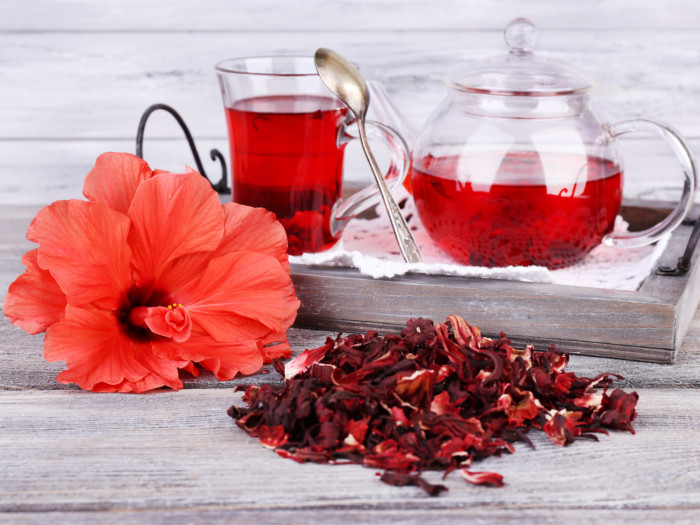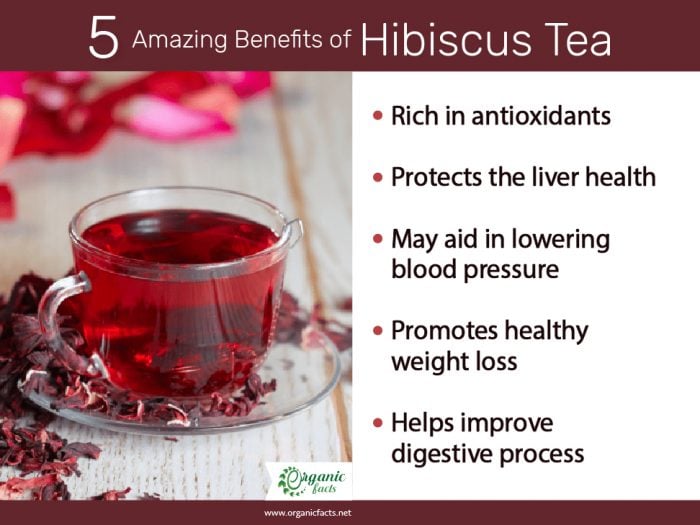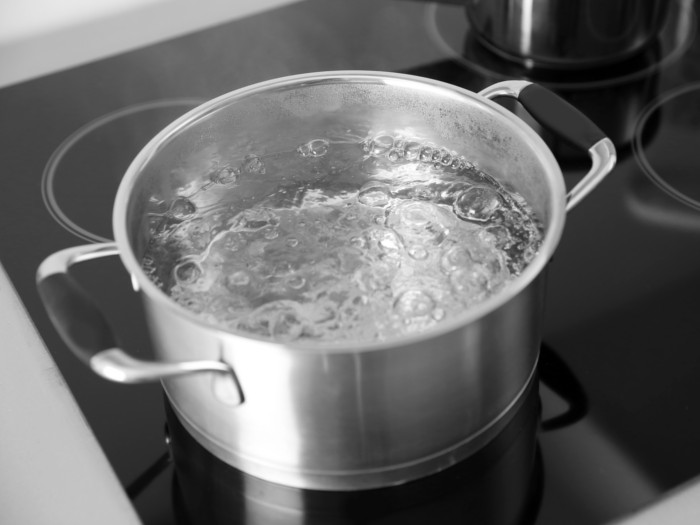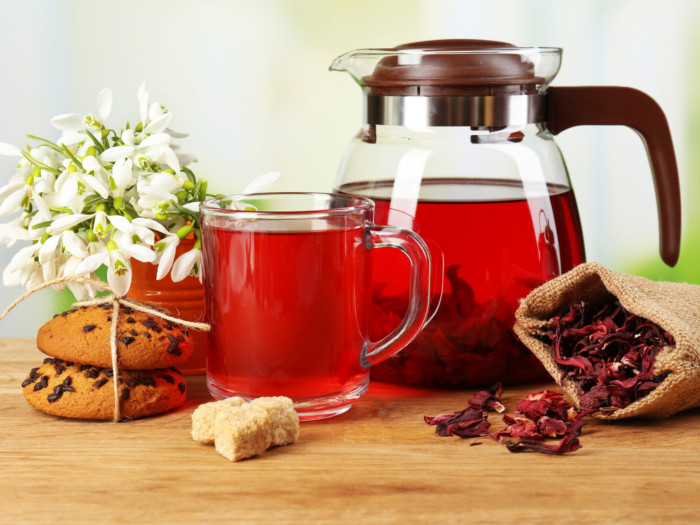The health benefits of hibiscus tea might include blood pressure management, improved liver health, and management of cholesterol. It may also help in improving immunity.
Not just that but research suggests that hibiscus tea may speed up metabolism and can aid in healthy, gradual weight loss. This tea is rich in vitamin C, minerals, and antioxidants
What is Hibiscus Tea?
Hibiscus tea, often referred to as Agua de Jamaica, is a vibrant ruby red or deep magenta beverage made by boiling parts of the hibiscus plant. With its distinct sour taste, it’s not only a favorite drink across the globe but also revered for its medicinal properties.
While the hibiscus flower goes by various names, in certain regions it’s called “Roselle.” You can find it readily available in tea aisles, and whether you like your tea hot or cold, hibiscus tea is versatile to suit your taste.
Among the several hundred hibiscus species, Hibiscus sabdariffa is the most commonly used for brewing this tea. [1]
Hibiscus Tea Nutrition
Hibiscus tea is naturally low in calories and is caffeine-free. According to the USDA Nutrient Database, it has a good supply of minerals including calcium, iron, magnesium, phosphorus, potassium, sodium, and zinc. It also contains B-vitamins like niacin and folic acid. This tea is a good source of anthocyanins, which may make it beneficial for managing elevated blood pressure levels, the common cold, and urinary tract infections (UTIs). [2] [3]
| Serving Size : | |
|---|---|
| Nutrient | Value |
| Water [g] | 99.58 |
| Ash [g] | 0.42 |
| Calcium, Ca [mg] | 8 |
| Iron, Fe [mg] | 0.08 |
| Magnesium, Mg [mg] | 3 |
| Phosphorus, P [mg] | 1 |
| Potassium, K [mg] | 20 |
| Sodium, Na [mg] | 4 |
| Zinc, Zn [mg] | 0.04 |
| Manganese, Mn [mg] | 0.48 |
| Niacin [mg] | 0.04 |
| Folate, total [µg] | 1 |
| Folate, food [µg] | 1 |
| Folate, DFE [µg] | 1 |
| Choline, total [mg] | 0.4 |
| Sources include : USDA [4] | |
Health Benefits of Hibiscus Tea
The various potential benefits of hibiscus flower tea which can help in keeping the human body fit are given below. Read on and get healthier!
Role in Blood Pressure Management
The American Heart Association highlighted in a November 2008 report that hibiscus tea might significantly lower blood pressure in adults who are pre-hypertensive or mildly hypertensive. [5]
In a focused study involving 46 participants with high blood pressure, those who consumed hibiscus tea for a month experienced a more pronounced reduction in both systolic and diastolic pressures compared to those on a placebo. A 2010 study at Tufts University in Boston further revealed that thanks to its anti-inflammatory attributes, hibiscus tea could potentially slash blood pressure by up to 10 points. However, for such a notable change, one should drink three cups daily over several weeks. Its diuretic nature also aids in increasing urination, which in turn can help in reducing blood pressure. [6] [7] [8]
While hibiscus tea offers a natural approach to managing blood pressure, those on blood pressure medications should exercise caution, as the tea might interact with these drugs. [9]

Freshly brewed hibiscus tea Photo Credit: Shutterstock
A Potential Ally in Weight Loss
Research indicates that hibiscus tea might be a promising aid in weight loss and obesity prevention. A study involving participants with a BMI of 27 or more, aged between 18-65, showcased that Hibiscus sabdariffa extracts (HSE) consumption over 12 weeks led to a decrease in body weight, BMI, body fat, and waist-to-hip ratio. [10]
Furthermore, hibiscus has been shown to positively influence blood glucose, total cholesterol, high-density lipoprotein cholesterol, triglycerides, and blood pressure. It also aids in reducing lipid absorption and promoting the oxidation of fatty acids in vital abdominal organs. Interestingly, while higher doses sometimes offered more pronounced benefits, especially in animal body mass, lower doses often yielded similar effective results. [11]
May Help in Managing Cholesterol
Research has delved into the potential benefits of hibiscus tea in managing cholesterol levels. One study focusing on type II diabetes patients found that hibiscus and sour tea consumption might lower cholesterol, triglycerides, and LDL cholesterol while boosting HDL cholesterol, offering a potential tool for managing this condition. [12]
A 2011 study pitted hibiscus against black tea, with 90 high-blood-pressure participants drinking either tea twice daily for 15 days. After a month, while LDL or “bad” cholesterol remained unchanged in both groups, there was a notable rise in total and HDL or “good” cholesterol levels. [13]
Fast forward to 2022, a review suggested that hibiscus tea might be more effective in reducing LDL cholesterol than other teas or placebos. However, the waters are muddied by conflicting findings. A comprehensive review of seven studies, encompassing 362 participants, found that hibiscus tea didn’t significantly alter total cholesterol or triglyceride levels. [14] [15]
In essence, while some findings are promising, more rigorous studies are required to pinpoint hibiscus tea’s exact role in cholesterol management.
May Aid in Improving Liver Health
The antioxidant-rich hibiscus tea has been spotlighted in research for its potential benefits in liver health. A 2014 study in the Food & Function Journal revealed that when 19 obese individuals with liver steatosis (a condition marked by fat accumulation in the liver) were given hibiscus extract for 12 weeks, there was a notable improvement in their condition. [16] [17]
Animal studies further bolster these findings. Hibiscus extract showcased liver-protecting properties in hamsters, reducing markers of liver damage. Moreover, a 2022 study found that rats on a high-fat diet showed improved fatty liver conditions when treated with hibiscus extract. [18] [19]
However, it’s essential to note that these studies primarily focused on hibiscus extract, not the tea itself. More research is needed to determine the direct impact of hibiscus tea on human liver health.

Hibiscus flowers have various names and are known as “Roselle” in some places.
A Potential Boost for Immunity
Hibiscus tea, derived from the plant’s loose leaves, is believed to be a good source of ascorbic acid or vitamin C, a vital nutrient that invigorates our immune system.
Beyond its antioxidant prowess, hibiscus has shown promise in warding off bacterial infections in test-tube studies. One such study pinpointed hibiscus extract’s ability to thwart E. coli, a bacteria notorious for causing digestive discomforts like cramping and diarrhea. Another found that hibiscus extract combated eight bacterial strains, matching the efficacy of certain antibacterial medications. [20] [21]
A study in the Drug and Chemical Toxicology journal revealed that rats given hibiscus extract witnessed a surge in their antioxidant enzymes, slashing the detrimental effects of free radicals by a whopping 92%. [22]
However, it’s essential to note that these findings are yet to be replicated in human studies. Thus, the exact anti-inflammatory and antibacterial benefits of hibiscus tea for humans remain a topic for further exploration.
Can Be Effective In Improving Digestion
Hibiscus tea is often sought after for its potential to enhance digestion. It’s known to promote regular urination and bowel movements, making it a go-to for many seeking relief from constipation. A study in the IOSR Journal of Biotechnology and Biochemistry highlighted its diuretic attributes and its role in bolstering gastrointestinal health. [23]
Moreover, hibiscus is a treasure trove of calcium, essential not just for robust teeth and bones but also pivotal for the optimal functioning of digestive enzymes. Its gentle laxative and diuretic properties, coupled with a substantial fiber content (around 33%), foster the growth of beneficial gut bacteria. This combination makes hibiscus a potential ally for a thriving digestive system. [24]
How to Make Hibiscus Tea?
Here’s a classic spin to your otherwise mundane tea. Hibiscus tea has several health benefits. You can get dried hibiscus flowers easily from departmental stores or online portals. If you find them in your garden, nothing like it. The red color in the tea is because of these flowers. So, without any further ado, let’s take a look at how to prepare it.

Hibiscus Tea Recipe
Ingredients
- 2 tsp dried hibiscus flowers
- 1 cup boiling water
- cinnamon stick optional
- clove optional
- tea bag optional
- lime wedges optional
- ginger optional
- mint leaves optional
Instructions
- On the stove, keep a pot of water to boil. Meanwhile, keep all the ingredients ready for the recipe, if you haven't.

- Take 2 tsp of dried hibiscus flowers, which equals to 10 ml of the same (to be more accurate), and add it to the boiling water. You are free to add more or less of the hibiscus flowers, depending on how strong you want your tea to be. It's important to note here that hibiscus tea doesn't have caffeine, so adding a lot of it won't harm your health.
- Once the water is boiled, pour the water slowly and steadily into a teapot. Make sure you have worn mittens/gloves to protect your hands from any kind of burns.
- If you want to add caffeine to your tea, add a teabag to the concoction. Allow it to steep for five minutes. While you wait, the hibiscus flowers will give the water a somewhat sharp, zingy taste. If you wish your tea to be strong, allow it to steep for more than 5 minutes.
- Once done, pour the tea into your cup, using a metal strainer. If your teapot has an in-built filter, the process will be way easier. Some people like to chew the hibiscus petals and don't prefer to strain them. You can try that as well if you like.
- Don't forget to add your preferred sweetener to the beverage. Try it with honey if you can, as it goes very well with the zestfully tart flavor of the tea. You can add sugar or stevia as well, depending on your choice.

Notes
Hibiscus Tea Side Effects
Although hibiscus tea is a health enhancer and a natural weight loss booster, there are possible side effects you should be aware of.
- Blood pressure: The health benefits of hibiscus tea include lowering blood pressure (antihypertensive properties). Therefore, it is not recommended for people who already have low blood pressure or hypotension. [25]
- Pregnancy and fertility: According to an article published in BJOG: An International Journal of Obstetrics and Gynaecology, hibiscus tea is not recommended for pregnant women, particularly due to its emmenagogue effects, which may stimulate menstruation or blood flow in the uterus or pelvic region. According to MedlinePlus, hibiscus can cause shakiness, constipation, and stomach discomfort. For those undergoing hormonal treatments or taking birth control pills, it is recommended to consult your health specialist regarding the consumption of this variety of tea. [26] [27]
- Diabetes & surgery: Hibiscus may lower the blood sugar levels so it is best advised to consult your doctor if suffering from diabetes or planning to undergo surgery. [28]
Note: Consult your doctor if taking medications such as Chloroquine, antidiabetic medications, or Zocor before using hibiscus tea.
FAQs
Is Hibiscus tea good for you?
Not many people are aware that almost 15-30% of hibiscus tea is composed of organic acids. These acids are malic acid, tartaric acid, and citric acid. They are commonly found in fruits such as grapes and wine. They help in boosting immunity, promoting better skin, lowering blood pressure and cholesterol, managing inflammation, and improving digestive issues. Hibiscus tea has diuretic and choleretic effects, thus controlling blood viscosity by reducing blood pressure and enhancing digestion.
How much Hibiscus Tea Should I Drink?
Hibiscus tea is not very potent if you have the decaffeinated version. Ideally, one cup of this brew is enough to enjoy the health benefits outlined above. Consuming more than this can increase the risk of certain side effects. It is advisable to consult a doctor before consuming it.
Where to Buy Hibiscus Tea?
You can easily make hibiscus tea at home if you have the flowers growing in your backyard. If you don’t have access to a hibiscus plant, the tea is best made with:
- Organic dried hibiscus flowers
- Hibiscus tea bags
They are both available online as well as in local supermarkets. Hibiscus tea is also used as a sports drink to satiate thirst. For this purpose, hibiscus tea is typically consumed cold, as an iced tea. Many people include it in their diet since this variety of tea has the ability to cool down the body very fast. You can drink hibiscus tea either as a hot tea or an iced tea. If you want to keep yourself warm in the winter, brew it and drink it straight away. In case you do not want to drink it hot, during summer, you have the option to drink hibiscus iced tea by steeping organic hibiscus flowers in water. It takes about 20 minutes for preparation, and then you can cool yourself off in a healthy, refreshing way. So go ahead and brew a cup full of goodness!


